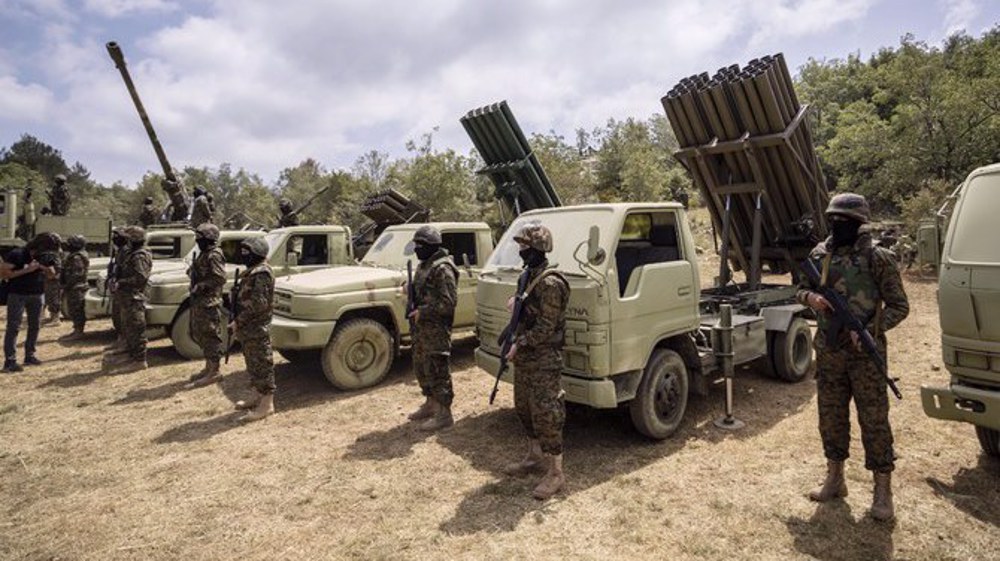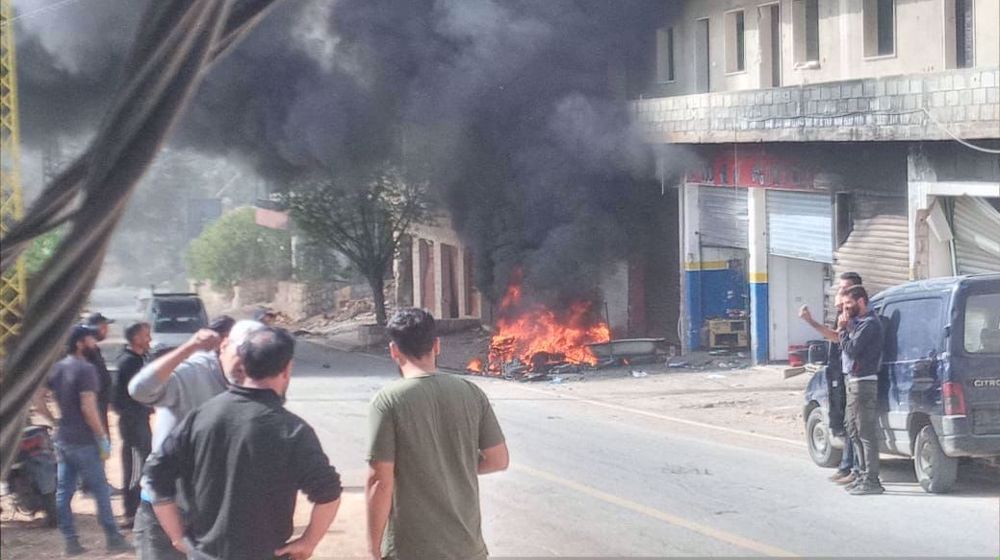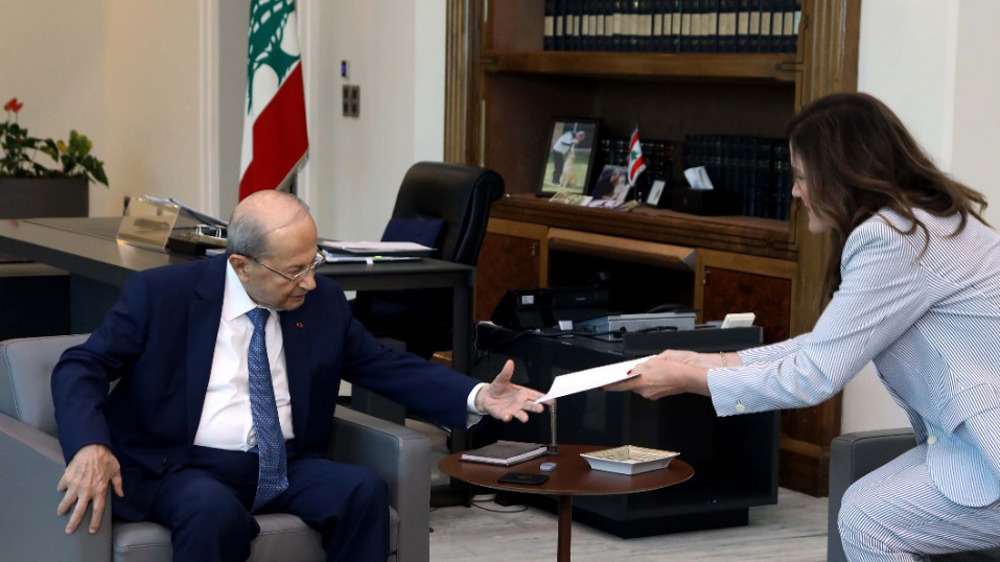Lebanon receives written US-brokered proposal for maritime border deal with Israel
The United States has handed over a long-negotiated written proposal to Lebanese President Michel Aoun to potentially resolve a maritime border dispute between the Israeli occupation and Lebanon.
According to a tweet posted by the Lebanese presidency’s account, President Aoun met with the US ambassador to Lebanon, Dorothy Shea. Through Shea, Aoun received the written proposal from US mediator Amos Hochstein on the demarcation of the maritime border with the Israeli regime.
Lebanon's local sources said Aoun contacted Speaker of Lebanon’s Parliament Nabih Berri and Prime Minister-designate Najib Mikati for a consultation on the US proposal.
The report said Aoun discussed with both officials “how to proceed to give a Lebanese response as soon as possible.”
Earlier on Friday, hoping that President Aoun would receive within 24 hours the written proposal from Hochstein, deputy Speaker Elias Bou Saab said, “The proposal will be studied and if it meets the conditions it will be positive and will be capitalized on.”
“The atmosphere is positive and we do not want to go too far in optimism pending the written response,” Bou Saab added.
“We have managed to resolve several pending points between the Lebanese and Israeli sides and the solutions are appropriate for Lebanon,” he said.
On Monday, the Lebanese president spoke about breakthroughs on the issue of demarcation of the Lebanese southern maritime borders, assuring that Lebanon will receive the wealth it deserves and that this file is reaching its "happy endings".
Also two weeks ago, Aoun informed the United Nations Special Coordinator for Lebanon [UNSCOL] Joanna Wronecka that the negotiations on the maritime border demarcation had reached their final stages that guaranteed Lebanon’s rights to extract gas and oil in the designated fields in its exclusive economic zone.
Mikati had previously underlined Lebanon’s absolute adherence to its sovereignty, rights, and resources in its regional waters and exclusive economic zone on the level of the country’s maritime border demarcation. He said the country is nearing an agreement with the Israeli occupation on the demarcation of maritime borders.
In August, Lebanon rejected an Israeli proposal on the demarcation of the country's southern maritime border. A Lebanese diplomatic source said as part of the offer, Beirut was required to give up the southwestern part of Block 8 in particular. But Beirut rejected to give up any square meter in Block 8.
On August 19, al-Akhbar Lebanese newspaper said Israel has pledged to acknowledge that Line 23 and the Qana prospect field are in Lebanese territory while also pleading with Hezbollah to set aside potential plans to attack gas fields in case of a delayed deal.
On the same day, Secretary General of Hezbollah Sayyed Hassan Nasrallah rejected any delays in the case as Lebanon is going through dire economic conditions. “Time is short, and depending on the [Israeli] response, we will surely act,” he said in a speech during Ashura mourning procession.
Hezbollah had set a deadline for Lebanon to secure its rights over the disputed areas, which will expire on September 15.
The Hezbollah chief earlier said the Israeli regime would not be allowed to conduct drilling operations for oil and natural gas in the disputed area in the Mediterranean Sea until Lebanon gets what it deserves.
“We sent a powerful message warning that the enemy not to extract from the Karish field until Lebanon is given its rights, as this would be crossing a red line,” Nasrallah said, noting “Our aim is to enable the Lebanese government from investing in its maritime wealth.”
He highlighted that Lebanon faced a historic chance in light of Europe’s need for an alternative to the Russian gas and oil.
In February 2018, Lebanon signed its first contract for drilling in two blocks in the Mediterranean with a consortium comprising energy giants Total, Eni, and Novatek.
Lebanon and the Israeli regime took part in indirect talks to discuss demarcation in 2020. But the talks stalled after Lebanon demanded a larger area, including part of the Karish gas field, where Israel has given exploration rights to a Greek firm.
The talks were supposed to discuss a Lebanese demand for 860 square kilometers (330 square miles) of territory in the disputed maritime area, according to a map sent to the United Nations in 2011. However, Lebanon then said the map was based on erroneous calculations and demanded 1,430 square kilometers (552 square miles) more further south, including part of Karish.

MP: Hezbollah weapons ‘internal matter’ amid US pressure to disarm

Lebanese students protest to show solidarity with Palestinians in Gaza

Lebanese man killed as Israel strikes south in violation of ceasefire
Ex-official: US cares about human rights only to target adversaries
'Not much time left' to save Palestinians, warns UN Rapporteur
Scholar: Without strong response, Arabs risk falling under Israeli control
VIDEO | Press TV's news headlines
1,000 Israeli aircrew defy threat of sack to urge end to Gaza war
Trump decimates US healthcare
MP: Hezbollah weapons ‘internal matter’ amid US pressure to disarm
Iraq's Kata'ib Hezbollah: Disarmament reports 'lies and fabrications'







 This makes it easy to access the Press TV website
This makes it easy to access the Press TV website